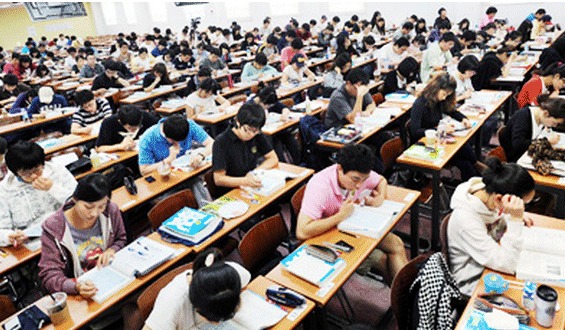
Koreans and Studying English (part I)

Studying English is an obsession in Korea. For some it is a hobby, for some a social activity they enjoy and for others a serious endeavor. English is also viewed as a sign of social status in Korea. English is viewed as means to gain social prestige and financial success.
English is everywhere. English is taught and studied in a variety of ways in South Korea. Besides being taught in public schools from elementary through high school, or private tutoring, you have English on the radio, English education programs on t.v, English news paper etc. Then there are the numerous private institutes or ‘Hakwons’ that teach English from phonics to conversation, to test Preparations.
The motivations for learning English are varied. Due to globalization and the launch of countless multi-national companies, English is becoming more important these days. Employees working in these multi national companies are required to communicate in English and many companies prefer to hire candidates with a good TOEIC score. Many students learn English to get good scores in the standardized English test to get a good job, get admission in reputable national universities or abroad and to get a promotion at work.
Millions of Koreans learn English. They put a lot of time, effort and money in learning English. Most Korean students go to private language institutes after school which are pretty pricey. They spend hundreds to millions of won on private tutoring or test preparations. Yet, most Koreans do not speak English fluently or even adequately considering all the money and effort they invest.
Why most Koreans cannot speak English well even though they learn English practically all their adult life is not only perplexing for many foreigners but is also a highly controversial topic in Korean society.
Whose fault is it?
So what’s the problem? Who’s to be blamed? We can play the blame game until everyone involved is blue in the face, the fact remains that the problems are so deep-rooted and firmly embedded in the system that for any REAL change to take place the whole education system needs an overhaul.
Most people believe that the education system itself is faulty. The problem apparently lies in the way that English is taught here. While I do agree that the education system needs to be reformed, I do believe there are a lot of other factors both internal and external that contributes to the problem.
Factors contributing to the problem
Most students learn English from elementary through high school, in addition to joining the private institutes. The private institutes are everywhere offering various methods to study English. Despite the fact that millions of students are ‘studying’ English very few are actually ‘learning’.
Rote Learning

The ‘Korean way of learning’ is the biggest hurdle in the success of ESL in Korea. Much of what is taught is based on ‘rote learning’. The primary learning objective is to prepare students for testing and has no real world value. Rote memorization is used to learn the grammar and sentence structure etc without the student actually learning the basic rules properly. The Korean style of learning adheres to memorization and repetition. Students were expected to memorize huge amounts of grammar rules
The over reliance on rote learning suppresses creativity and children grow up unable to think outside the box and lack the critical thinking skills required to participate in meaningful communication. The students are conditioned to memorize and focus only on what they are told they must remember.
Grammar, grammar

Learning grammar is overstressed in Korea. Focusing solely on grammatical structure is simply not an effective way to learn a second language. These English grammar classes are taught in Korean by Korean teachers. Many of the teachers are not properly trained or qualified for teaching. A large number of the so called ‘Korean English teachers’ can barely communicate in English or use grammatically wrong sentences and have terrible pronunciation, yet they teach the subject.
Unqualified teachers
The problem of unqualified teachers does not stop with the Korean teachers. Any graduate from one of the ‘native’ countries with no background in English or education can come and teach in Korea. Many of these so called ‘teachers’ are recent graduates and treat Korea like an extended year of university. They are really not interested in teaching. They want to pay back their student loans and travel. A teaching job in Korea helps them achieve these goals, and so they treat it as such. This is not to say that ALL native teachers are like this but a few are.
Preference given to the ‘country of origin’
In Korea too much emphasis is placed on country of origin rather than the ability to teach English. Currently the applicants who qualify to teach English in Korea must be from one of these seven English speaking countries: Australia, New Zealand, the U.K., Ireland, South Africa, the U.S. or Canada. People from other countries, regardless of how gifted they may be at teaching English as a foreign language, are not welcome, and no exceptions are made. Koreans view the English of people other than the above mentioned seven countries as ‘unauthentic’. Many qualified and fluent Europeans or people from other countries are denied over people who don’t know the difference between “your” and “you’re”. Over the course of my 15 years teaching English here in Korea, I have met many people from these ‘native’ countries who can’t spell and use wrong grammar but are still teaching English in Korea. Another interesting trend on the rise in Korea these days is for Korean students to go to counties like the Philippines to study English. Students from more wealthy families still prefer going to the States or Canada to study but most middle class or well off students go to the Philippines instead. Therefore, these requirements does not make much sense. Since many students are going to the countries like the Philippines to study English and studying with Filipinos, why not change the requirements so that qualified teachers from the Philippines or other countries can come and teach.
Next post we will continue to discuss the factors that contribute to the inefficient ESL learning as well as take a look at a few things we can do to help.
